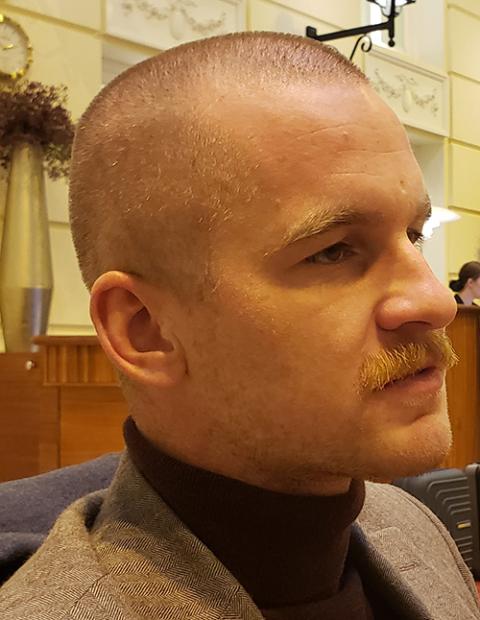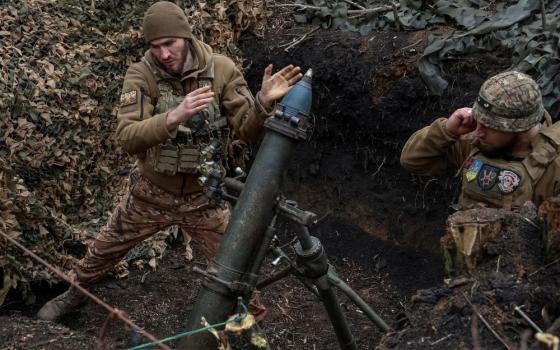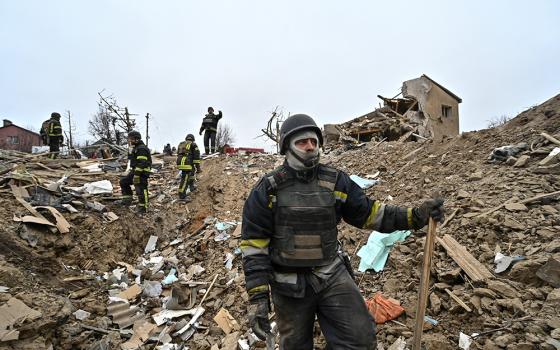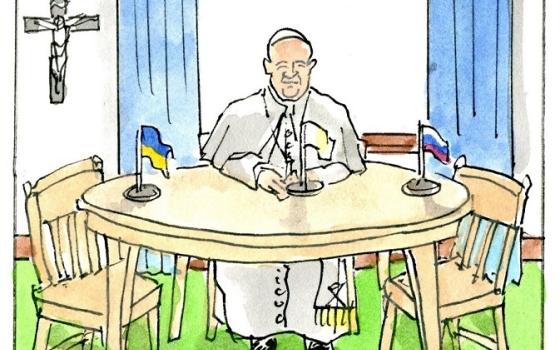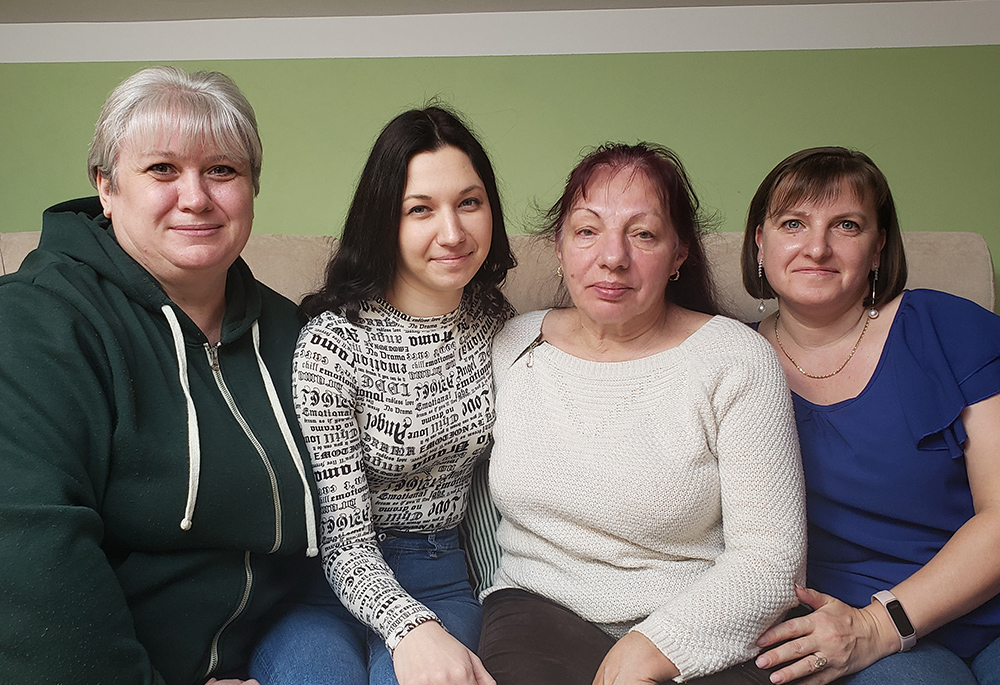
Four Ukrainian refugee women living in Jesuit seminary housing in Warsaw say they are ending a turbulent year safe, secure and calm — though still uneasily in exile. From left to right, the women are: Nadia Zhihalko, 46; Katya Zelinska, 27; Lubov Kadura, 67; and Yanyna Vasyk, 37. (NCR photo/Chris Herlinger)
Four refugee women from different parts of Ukraine thrown together by the sad fate of war say they are ending a turbulent year safe, secure and calm — though still uneasily in exile.
"I'm happy to be here," said Katya Zelinska, 27, in the offices of Jesuit Refugee Service in Warsaw, near a Jesuit seminary residence in the Polish capital, where the four now live. "I feel safe. I'm not nervous."
But she stressed, the current living situation, "is only for now." And the term "now," she and the other women acknowledged in two recent year-end interviews, has taken on weighted meanings as the conflict has stretched well beyond what either they or the war's Russian perpetrators expected.
Zelinska and the three others — Lubov Kadura, 67, Nadia Zhihalko, 46, and Yanyna Vasyk, 37 — are, of course, eager to return to Ukraine.
"Naturally, I want to go back. That's where my life is. Everything I know," Zhihalko said, her voice trailing off. "Home is home. Going back home is the important thing."
But the women remain resolute that ending the war cannot be accomplished at the expense of ceding any territory to Russia — and that includes land Russia annexed in 2014, such as the Crimean Peninsula.
"Nooooo," they said in unison at the JRS offices, which adjoin the Catholic Academy in Warsaw – Collegium Bobolanum, whose campus includes a Jesuit seminary and the St. Andrew Bobola Sanctuary.
"There's no other option," Vasyk said, shaking her head. "Ukraine must win. Why should we give up land? We only want peace, but as it was before 2014."
Kadura glanced at an American visitor. "We know the U.S. helps us," she said. "Please help as you can."
The women remain singularly grateful for the welcome accorded them and their families by Poles and by the Jesuits in particular.
They say they have heard of the growing unease by a small minority of Poles about the economic and social pressures welcoming 1.5 million refugees have placed on a country of nearly 38 million. But to a person they say they have not experienced discrimination or flashes of anger or prejudice.
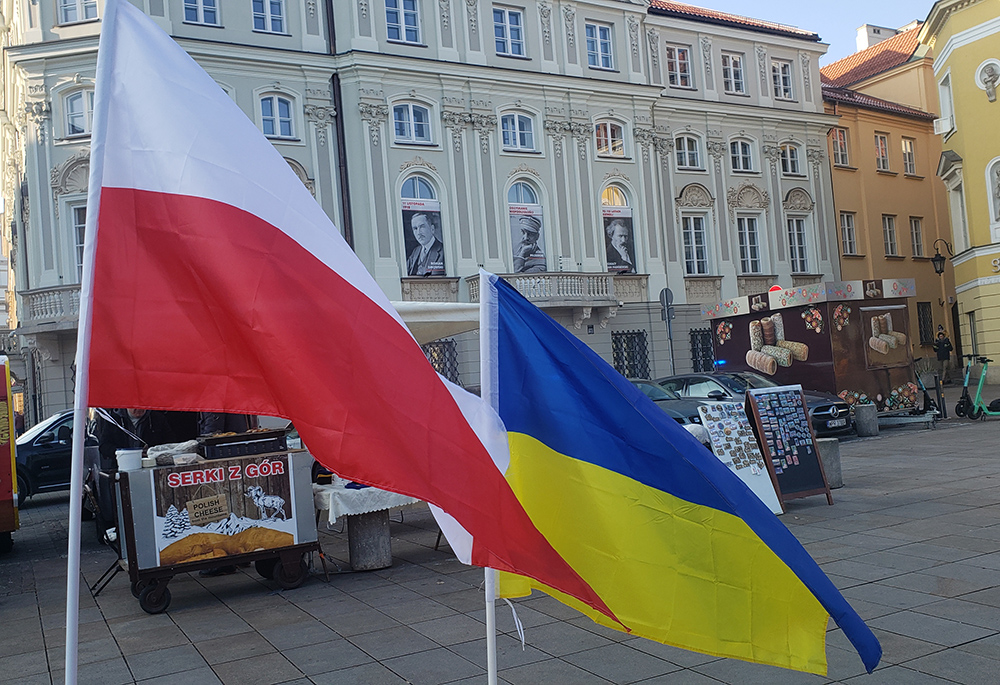
Polish and Ukrainian flags seen on a street of Warsaw's Old Town prior to Christmas. Despite historical tensions, observers say the two countries view Russia, which invaded Ukraine in February, as a common enemy and as a result, are improving relations with each other. (NCR photo/Chris Herlinger)
What they have experienced is the challenge of learning the Polish language, which has an entirely different script than Ukrainian, as well as having to take low-paying jobs, like cleaning houses — a common experience for many Ukrainian refugees who, as a group, are predominately female. (Most husbands, brothers, fathers and boyfriends remain in Ukraine, conscripted into military service.)
Sebastian Lelek, one of the Jesuit seminarians hosting the refugees, said the women — several of whom have children living with them — have adapted well to their new surroundings, with both the refugee families and the Jesuits enjoying tea, parties and occasional meals together.
By the end of the month the four families will move out of their fourth-floor space to new quarters on the seminary campus, providing the women and families with more privacy. (In all, the Jesuits are housing 11 persons right now: five women, two men and four children.)
Lelek, 34, said the families will be able to stay indefinitely and that his religious order does not find it particularly remarkable or unusual that they are offering space to the Ukrainian women and their families.
"This is nothing special for Christian people. It's obvious we have to welcome them," he said in an interview. "It's in the Bible. It's humanitarian. It's natural."
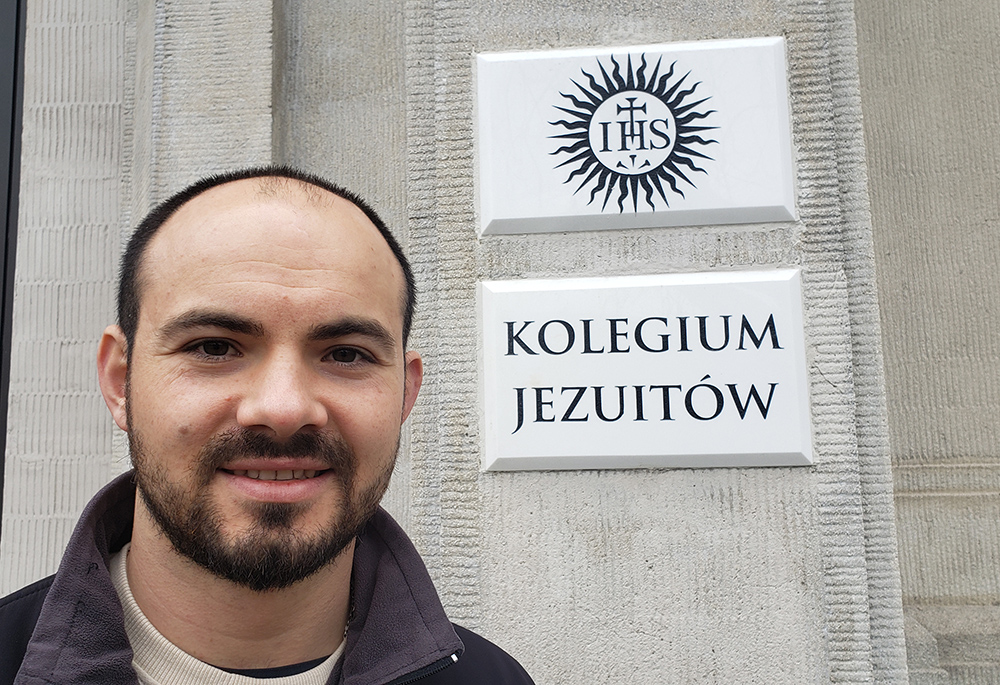
Sebastian Lelek, a Jesuit seminarian in Warsaw, outside the campus of Catholic Academy in Warsaw — Collegium Bobolanum, whose campus includes a Jesuit seminary and the St. Andrew Bobola Sanctuary. The Jesuits are providing housing for 11 arrivals from Ukraine: five women, two men and four children. (NCR photo/Chris Herlinger)
Lelek took a wide view of the Polish response since the Russian invasion in February.
"Everyone wanted to give something at first," he said, and the overwhelming initial response was perhaps a bit ad hoc. He recalled that his grandmother, who lives in Rzeszów, located in the southeast Polish region of Podkarpacie, near Ukraine, took in arrivals as part of a welcome from her local parish.
At one point, she took in as many as 20 people — as well as two dogs — but only for a few days. The last of the guests left after about three weeks, and Lelek's grandmother is no longer hosting anyone.
Despite WWII's uneasy shadows, 'we live together'
As the numbers have declined since the first months of the war there is now more coordination by government bodies and humanitarian groups about housing and assisting new arrivals.
Broader historical dynamics are also at play. Relations between Poland and Ukraine have not always been cordial, with uneasy shadows from World War II still lurking. Poland gave up territory to Ukraine, then part of the Soviet Union, after the war, and both countries bear grudges over civilian deaths perpetuated by the other before and during the war.
Both Poland and Ukraine have also claimed victimhood in ongoing debates centering on genocide and war-time massacres that occurred in border regions.
Advertisement
Yet both Poland and Ukraine now view Russia as a common enemy, and Lelek sees the welcome from Poland as a way to restart relations from a better, more hopeful place.
"It's important to me that we live together. In the past, things were not easy. What's happened [in Poland in the last 10 months] is a good step. We want good things for Ukraine," he said. "I think the situation of war has made us think about the relations between our countries."
Even so, the situation is evolving, said Sr. Urszula Krajewska, an attorney and member of the Religious of the Sacred Heart of Jesus who works for Jesuit Refugee Service in Warsaw.
"The warm welcome now is probably not as enthusiastic as it was initially — people generally got used to having Ukrainian refugees around," said Krajewska, whose work also includes coordinating Polish language courses for refugees.
As the situation has become "normalized" there are also pressures — with hundreds of thousands of children requiring schooling, with mothers needing work, and Ukrainian families wanting long-term housing, given that it is far from clear how long the war in Ukraine will last. (Last month, the Polish government said refugees, many of whom have been receiving public assistance, should start paying for some of their food and housing costs.)
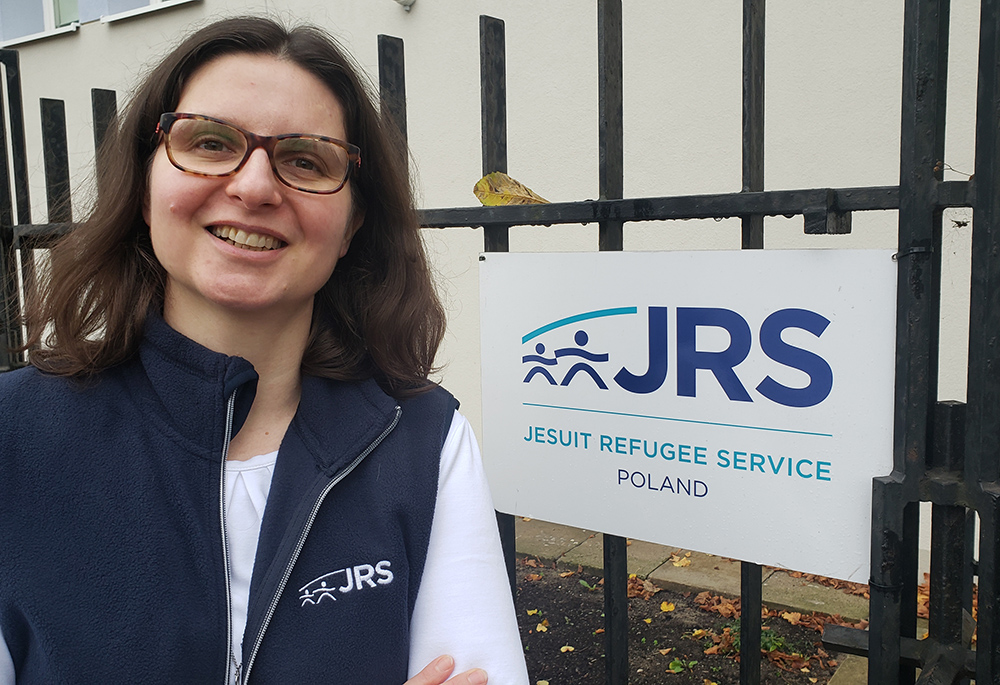
Sr. Urszula Krajewska, an attorney and member of the Religious of the Sacred Heart of Jesus works for Jesuit Refugee Service in Warsaw. She says the warm welcome accorded to Ukrainians by Poles during the start of the war earlier this year "is probably not as enthusiastic as it was initially — people generally got used to having Ukrainian refugees around." (NCR photo/Chris Herlinger)
If Ukraine faces a huge task of rebuilding and reconstruction, Poland right now faces not only the burdens and pressures of more people within its borders but worsening inflation and spiraling energy and gas costs, all due to the fallout from the war and reductions in Russian energy imports.
Maciej Grześkowiak, a human rights lawyer in Warsaw who has helped coordinate the national refugee response, said it is too early to say how any possible tensions between Poles and Ukrainians living in Poland may play out.
"There is still potential for things bubbling up," he said in an interview. "A lot will depend on how hard the winter is."
If there is any growing resentment towards the new arrivals, Grześkowiak said it will have more to do with concern about the strain on public services than Polish nationalism, which was a factor in recent years.
In 2016, some Poles protested taking in refugees from predominantly Muslim nations in Africa and the Middle East. However, in 2021, others objected publicly to mistreatment at the border of Poland and Belarus and urged authorities to welcome new arrivals.
As it is, Grześkowiak believes Poland is becoming a more diverse country — "a good thing," he said — and economically, could benefit in the long term by having the Ukrainians remain in the country.
Still, no one denies the strains and difficulties of the last 10 months.
"Ukrainians are tired. Poles are tired. The war is tiring. It's a tiring situation for everybody," Krajewska said in an interview. And yet, like Lelek, she believes the war has drawn both Poland and Ukraine closer together.
In the end, she said, "it connects us, and doesn't divide us. Everybody understands who is to blame for this. Everyone knows what the situation is."
"The fact that Ukrainians are welcome hasn't changed," Krajewska said. But the "how" — how to house the arrivals in more permanent housing, for example — has changed, she added. Nearly a year on, she said, "it's harder now for people to house others in their homes — they prefer to help them in other ways."
And despite the fact that dozens of religious communities in Poland — both of men and women — have opened space to the refugees, much of the housing has been provided by private citizens, opening their homes — like Lelek's grandmother.
"It's not a typical situation to welcome strangers literally into your home," Krajewska said, and how that plays out in the coming months and years is far from clear.
And yet Poles, she said, "are working to give them [the Ukrainians] some hope.''
Nostalgia colors current holiday season
As for the holiday season and a new year, the four women, who are all Orthodox Christians, planned to observe Christmas in some way on Dec. 25 with their Jesuit hosts, but will celebrate in their own way on Orthodox Christmas Eve and Day, Jan. 6 and 7, respectively. (Most Orthodox Christians celebrate Christmas by the Julian calendar.)
They hope to cook together in their Jesuit kitchen space — possibly kutia (a sweet grain dish), potato dumplings, braised cabbage, fish and mushrooms. They also hope to toast the holiday with some red wine.
That will cure some of the nostalgia and heartache, though not all. It is common in Ukraine to make the rounds to visit friends and relatives and sing carols. "Those things in our home are very special," Zhihalko said. "People visiting, neighbors, guests. Normal life."
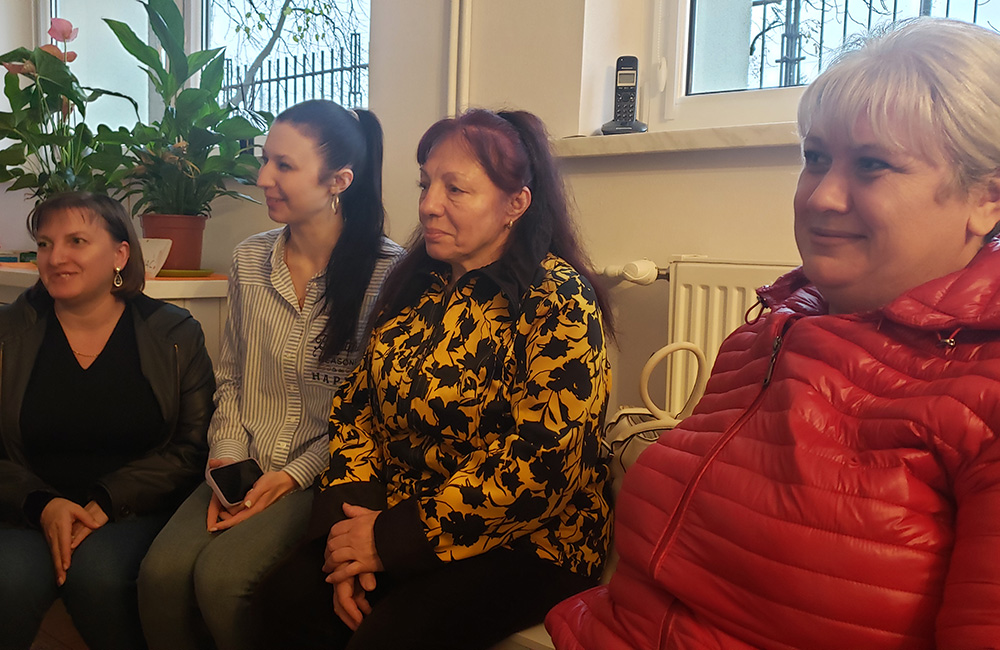
Four Ukrainian refugee women in the offices of Jesuit Refugee Service in Warsaw remain From left to right they are: Yanyna Vasyk, 37; Katya Zelinska, 27; Lubov Kadura, 67; and Nadia Zhihalko, 46. (NCR photo/Chris Herlinger)
As they contemplate Christmas pasts, the women are resolute that their present exile is borne from necessity — they each have memories of Russian bombardments, of seeking shelter. They also say they cannot have imagined a year ago living in Warsaw, residing in the midst of a Jesuit community.
"No, no, no," Vasyk said. "We never thought there would be war, even with the Russian threats. And we certainly thought it would end soon."
She paused, and recalled shared news of relatives and friends back in Ukraine through texts, social media and phone calls.
"Bombs landing every day, from the first day until now," Vasyk said. "It's just very, very hard. But here, at least, we are safe. We're not afraid."
In the face of the war's tragic and unexpected perils, snares and consequences, Krajewska held out hope for a deeper holiday experience this year — for both Ukrainians who have arrived and for the Poles hosting them.
"You can find God in this situation," Krajewska said. "God is present in this very difficult time — waiting for Christ to come. At this time of year, we know the true king will come and practice mercy and justice."

